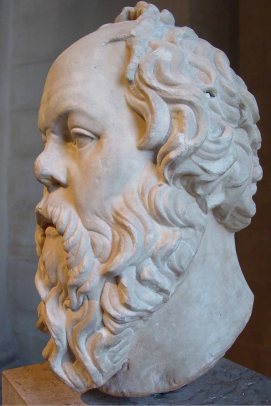Is success up to you, or does it just happen to you? In “Why Luck Matters More Than You Might Think,” Robert K. Frank says that luck plays a bigger part in success than most people think. And the more you appreciate the contribution of luck to your success, the happier and more generous you are likely to be.
E3: What makes a good person good?
Socrates’ heirs: Plato v. Diogenes
In “Socrates, Cynics and Flat-Nailed, Featherless Bipeds,” Nickolas Pappas describes two competing philosophical types that arose from the example Socrates set: sober Academics like Plato and mangy Cynics like Diogenes. “Philosophy has pulled in both directions, systematic and subversive, for as long as it has remembered Socrates. … The Academy had the originality to envision an intellectual society … distinguished by the virtues of modesty and self-control, always ready to usher new students into the tradition. Philosophy as a tradition would have withered without an academy to live in. If it sometimes appears to be withering within the academy, that is because the subversive side of Socrates has its appeal: the virtues of the eccentric, above all eccentric courage, and the willingness to make your life an improvisation.”
Having no reasons
In “How to Choose?,” Michael Schulson describes situations in which the rational thing to do might be to choose without having reasons for your choise. “When your reasons are worse than useless, sometimes the most rational choice is a random stab in the dark.”
Ought implies can … or not
In “The Data against Kant,” Vlad Chituc discusses psychological research challenging Kant’s principle that ought implies can. This is the principle that “it would be absurd to suggest that we should do what we couldn’t possibly do.” The research shows that there are common situations in which nonphilosophers do think it makes sense to say someone ought to do something that it is impossible for them to do it. In these situations “ought” has more to do with “blame” than with “can.” This in turn raises questions about “experimental philosophy” and the role the intuitions of nonphilosophers ought to play in philosophical analysis. Can we draw conclusions about what we ought to think from data about what some people actually think?
Thinking about death
In “To Be Happier, Start Thinking More About Your Death,” Arthur Brooks recommends ways to realign the balance between your momentary desires and your existential goals.
How we talk about passing
Daniel Silvermint’s “On How We Talk About Passing” won the 2015 second place prize awarded by 3 Quarks Daily for a philosophy blog post.
John Collins, the final judge for the contest, wrote of this post: “Silvermint’s piece, occasioned by last summer’s Rachel Dolezal incident, avoids the thorny issue of why, exactly, self-identification might be taken to be authoritative in the case of gender though not race, and asks us instead to hesitate and reconsider what we are doing when we rush to police the trespass of socially constructed categories that are tracked by highly unreliable markers. There is a valuable discussion here of the varieties of passing, though I found myself unsure as to whether to accept Silvermint’s suggestion that we apply the concept even to cases where there is neither misidentification nor intent. Can, for example, a white cisgender man, who, through privilege has had the luxury of never giving these matters a moment’s thought, really be said to be ‘passing’ as white and male? Silvermint comments that ‘a trans woman that passes isn’t a man pretending to be a woman – she is a woman’. I agree wholeheartedly with the main point there, but I’d be inclined to add that her being a woman means that she isn’t simply passing as a woman either. (Whether a trans person might be said to—or want to?—pass as cisgender is another matter.)”
The winning blog posts were selected from these nine finalists.
Stoicism’s moment
Why is being a Stoic so cool right now? Chiara Sulprizio explains the renewed popularity of Stoicism in “Why Is Stoicism Having a Cultural Moment?”
Choose gratitude
Arthur Brooks explains in “Choose To Be Grateful. It Will Make You Happier.” that it’s up to you whether to be thankful and that you’ll be better off if you choose to do so. “… we are more than slaves to our feelings, circumstances and genes. Evidence suggests that we can actively choose to practice gratitude — and that doing so raises our happiness.”
Living a lie
In “How To Live a Lie,” William Irwin considers whether you can live as if there are moral truths, as if God exists, and as if you have free will even if you believe none of these things is true. His conclusion? Morality and God, no … but free will, yes. “Well, I cannot believe in free will, but I can accept it. In fact, if free will fictionalism is involuntary, I have no choice but to accept free will. That makes accepting free will easy and undeniably sincere. Accepting the reality of God or morality, on the other hand, are tougher tasks, and potentially disingenuous.”
Use philosophy to get unstuck
In “How Philosophy Can Help Us Get Unstuck in Work and Life,” Jules Evans outlines seven pieces of practical advice from “one life-hack that a lot of entrepreneurs and business people have found useful” … ancient Greek philosophy and Stoicism in particular.
